IntoTheMinds realized a survey of 472 company executives to measure their perceptions of the impact of the war in Ukraine on their business. Through this research, we sought to understand whether the tense geopolitical situation affected their morale and impacted their employment and investment decisions.
The results are surprising in more than one way, as they show tremendous psychological resilience and positive expectations for the evolution in 12 months. We highlight differences in perception between SMEs and large companies and between men and women. Women are more pessimistic, which echoes our research on entrepreneurship.
If you only have 30 seconds
- We researched 472 company executives to measure their morale and their perceptions of the war in Ukraine
- Over 12 months, morale is high, and 67% anticipate a positive evolution of their company’s activity
- 45% believe that the economic situation is favorable to the recruitment of personnel, and 41% to investments
- Only 35% see the Ukrainian conflict as a factor in slowing down their business
- 27% believe that the impact of the war in Ukraine will be negative in terms of competitiveness
- The majority of SMEs believe that the war will have no impact, while large companies are more divided
- The impact on competitiveness is perceived more negatively in the provinces than in the capital
- Only large companies located in the capital believe that the war in Ukraine will have a positive impact on business
- Women are more pessimistic than men in their assessment of the impact on business and competitiveness.
Summary
- Company executives’ perceptions at 12 months
- Investment decisions
- Hiring decisions
- The perceived impact of the war in Ukraine on business
- The perceived impact of the war in Ukraine on competitiveness
- Differences in perceptions by size and location
- Differences in perceptions between men and women
Evolution of the economic situation over 12 months
Despite the tense geopolitical context and its economic consequences, companies do not anticipate a slowdown in activity in the next 12 months. Thus, 67% of the decision-makers interviewed in this research anticipate improving their company’s activity in the next 12 months. Only 6% expect to experience a negative impact.
This result, obtained during the first days of the war in Ukraine, demonstrates the psychological resilience of decision-makers in companies. They are not panicking and are betting on post-Covid growth to sustain their companies’ business.
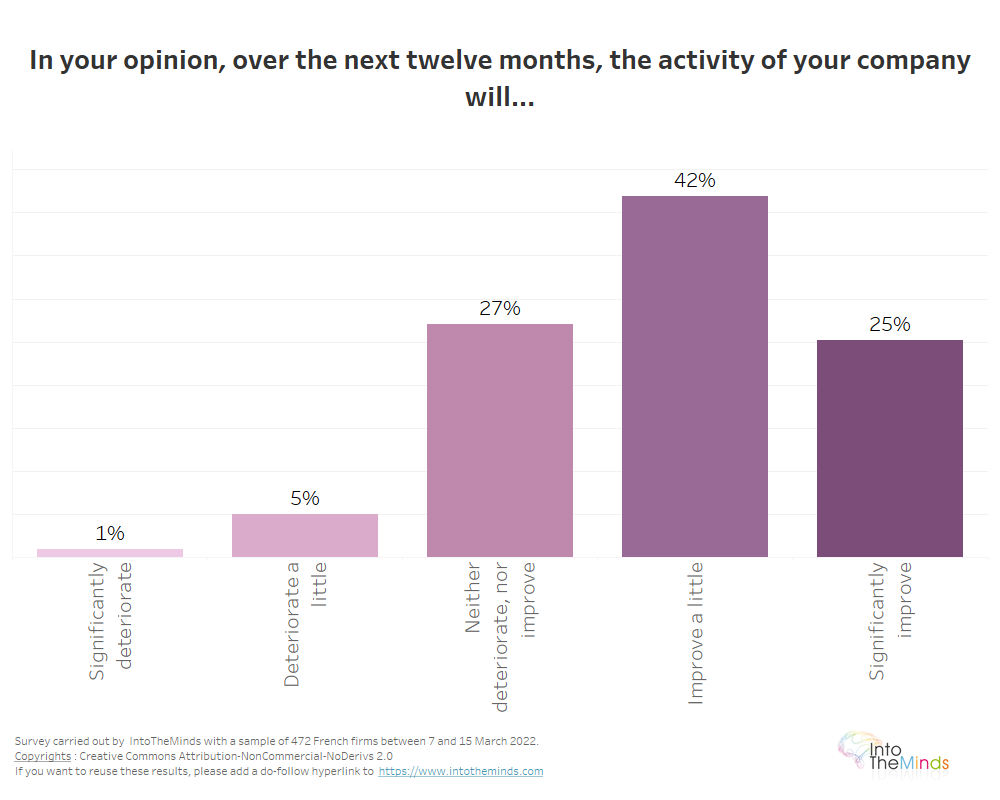
Impact of the economic situation on investment decisions
The good mood of the decision-makers surveyed is also reflected in their investment decisions. The current economic situation is viewed more positively. Only 14% of respondents believe that the current period is unfavorable for investment, compared to 41% who consider it favorable. Forty-three percent of large companies see investment opportunities, compared to 36% of SMEs. There is, therefore, a little less enthusiasm on the part of small and medium-sized companies.
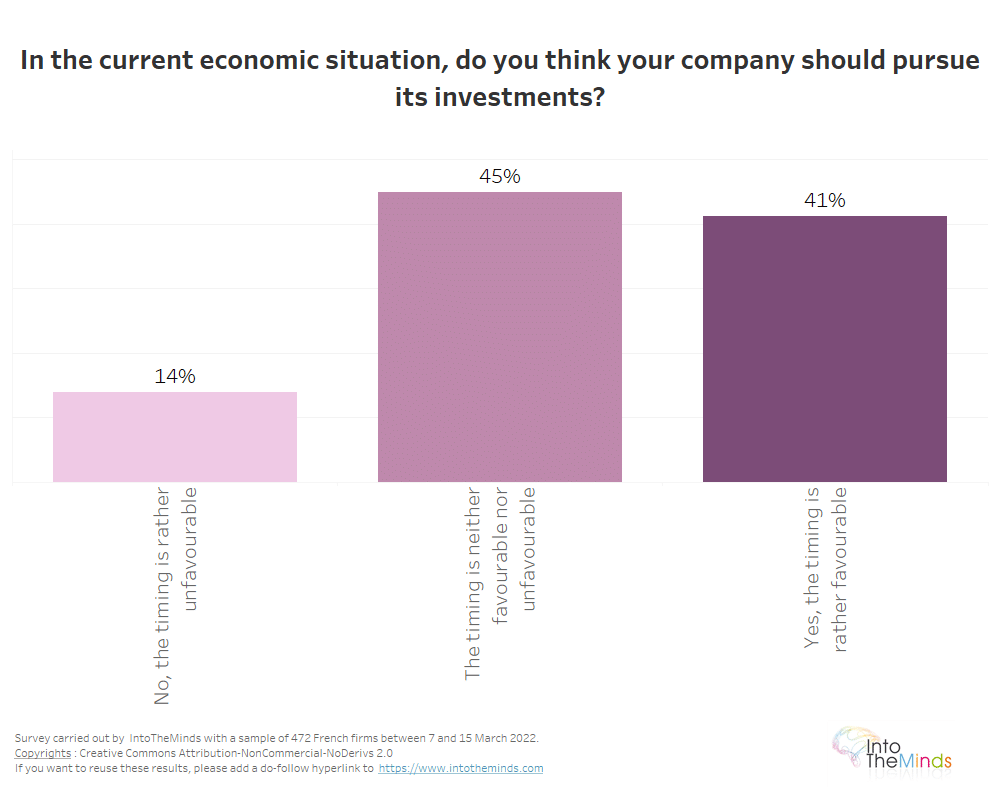
Impact of the economic situation on recruitment
The companies surveyed are also reasonably cautious when it comes to recruitment. Only a minority consider it inadvisable to recruit staff in the next 12 months. The majority of the companies surveyed (45%) see the period as favorable. There is a slight difference between SMEs (42%) and large companies (47%).
18% of SMEs consider the current period unfavorable for recruitment, compared to only 14% of large companies.
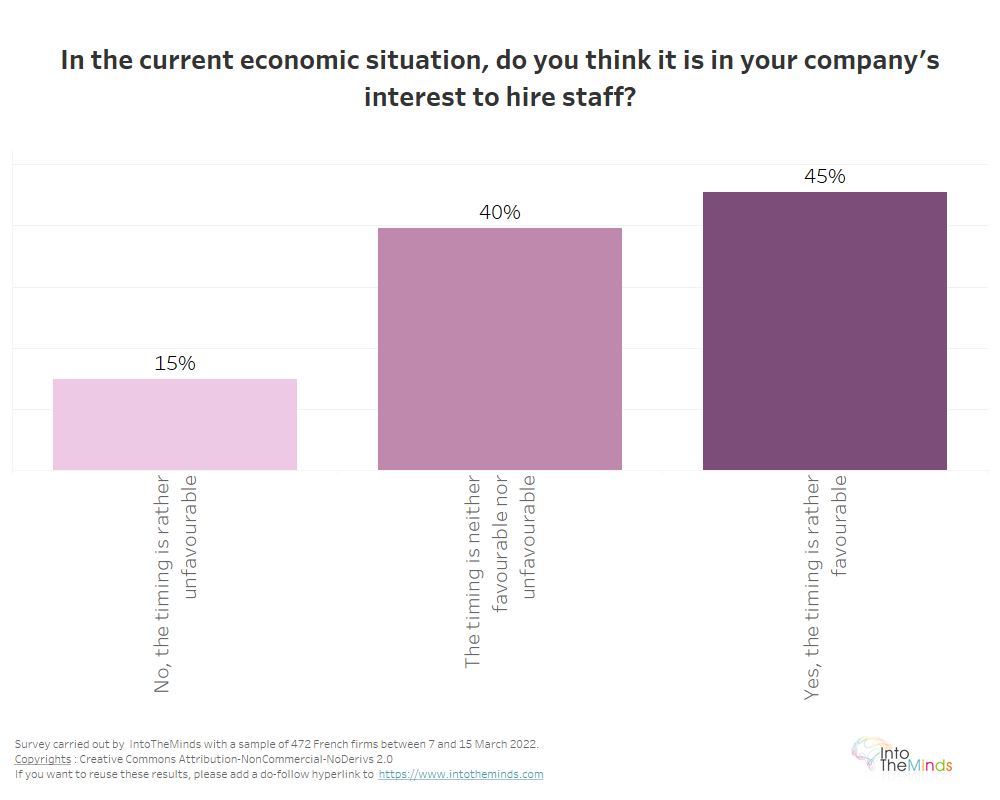
Impact of the war in Ukraine on the activity of companies
The war in Ukraine may be on Europe’s doorstep, but company executives are not worried about it much. The majority (43%) believe that the war will have no impact on their business. Only 35% think that the Russian-Ukrainian conflict will negatively impact their business.
However, the situation differs according to the size of the company. There are apparent differences between SMEs (<250 employees) and large companies. The enthusiasm of large companies (24% consider the impact to be positive) does not seem to be shared by SMEs (15%).
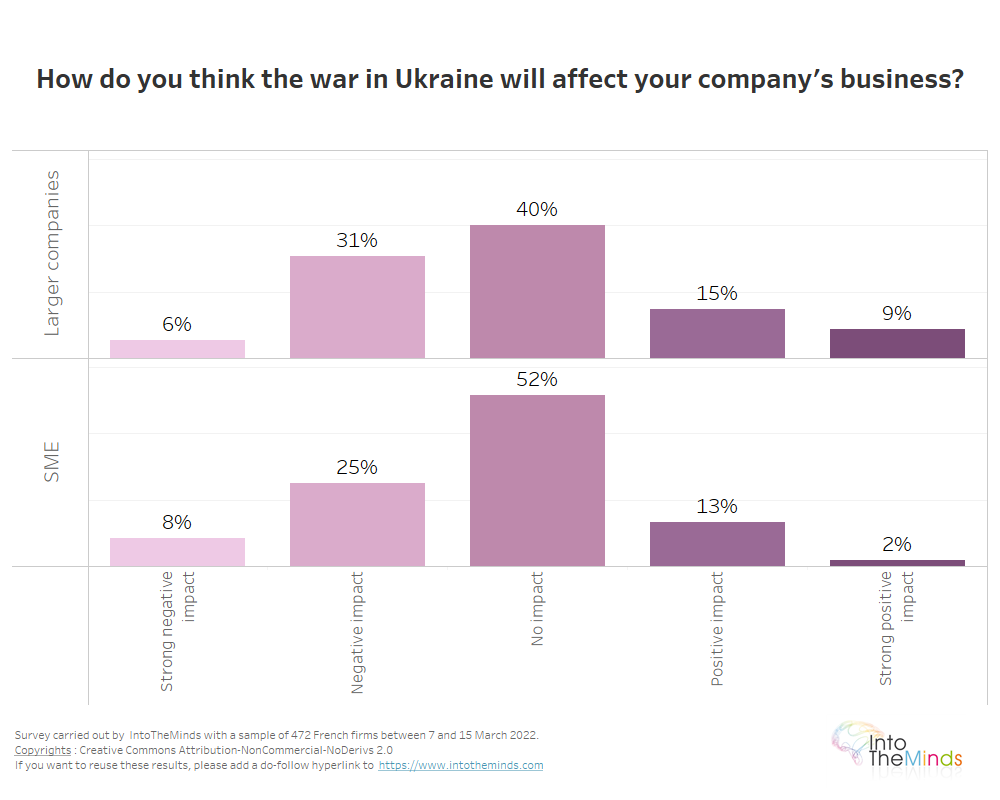
Impact of the war in Ukraine on the competitiveness of companies
The companies surveyed do not believe that the crisis in Ukraine will impact their competitiveness. More than half (52%) believe that the war will have no impact. 27% expect an adverse effect, and 23% expect a positive effect.
As with the previous question, the analysis by company size provides a different reading of these figures. Only 47% of large companies (>250 employees) believe that the war will have no impact on their competitiveness, compared to 63% of SMEs.
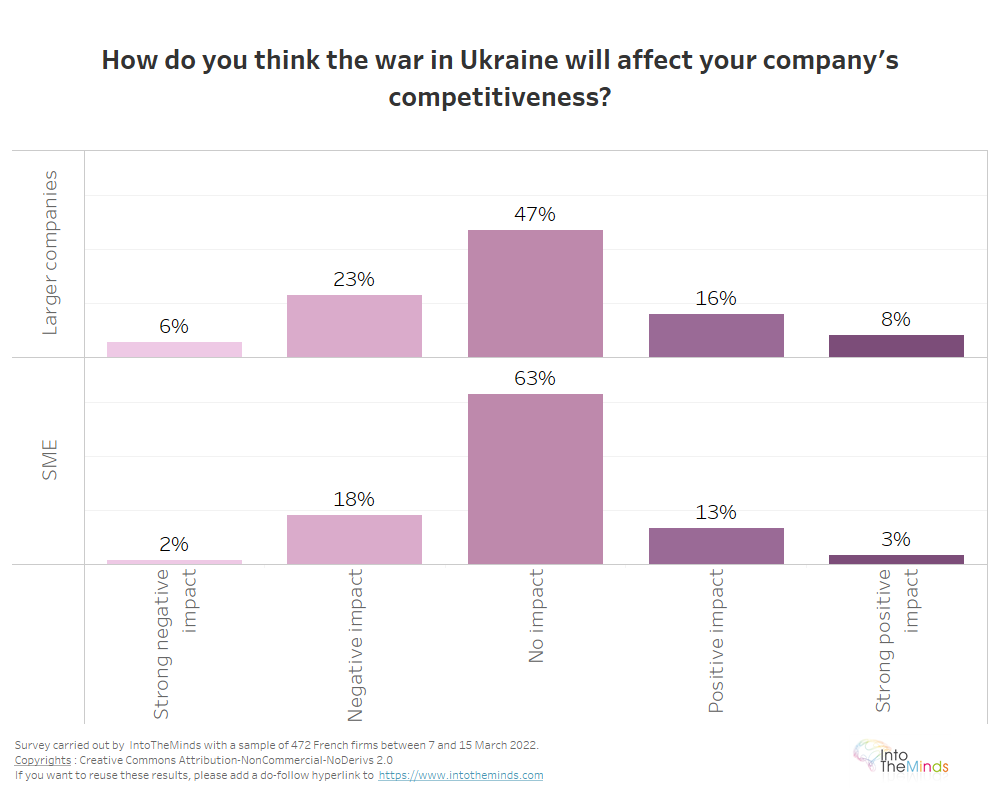
Company size and location influence executives’ perceptions
In the last part of this article, we focus on understanding how the results vary by company location and size.
We recode the previous results and assign a score to each response:
- strong negative impact = -2
- negative impact = -1
- neither positive nor negative = 0
- positive impact = +1
- strong positive impact = +2
The graph below shows the average according to the size (SME / Large company) and the company’s location (capital/province).
The perceived impact of the war in Ukraine on business is generally negative except for large companies located in the capital cities. It is the SMEs located in the capital that expresses the most fears.
In terms of competitiveness, there is an effect linked to location. Companies located in the provinces seem to be more anxious about the evolution of their competitiveness.
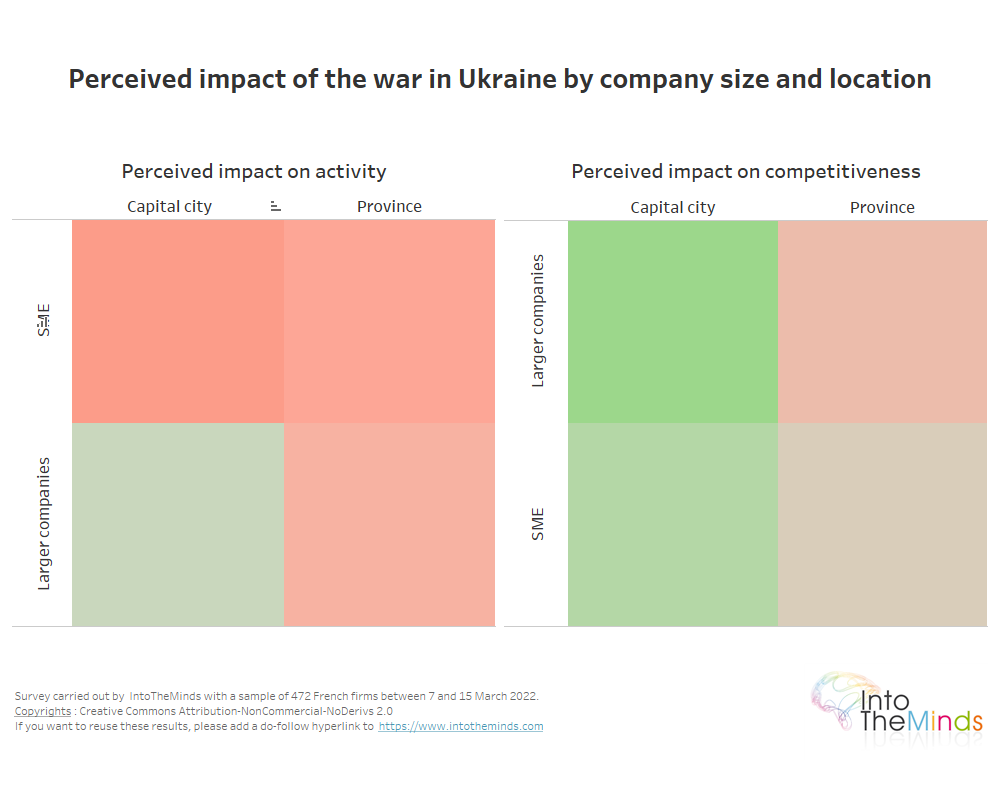
Gender effect: women more pessimistic than men
Finally, we examine the differences in perception that exist according to the gender of the decision-maker.
Our results show significant gender differences.
In terms of activity, women are slightly more pessimistic than men. The average score given by women is -0.24 compared to -0.11 for men.
When it comes to competitiveness, the difference is more apparent. Men are optimistic that their company’s competitiveness will improve, while women anticipate a deterioration.
While this result echoes the one we obtained in our primary research on entrepreneurship, we must be careful not to jump to conclusions. It could be that women are more present in specific sectors of activity that are more inclined to suffer from the effects of war.
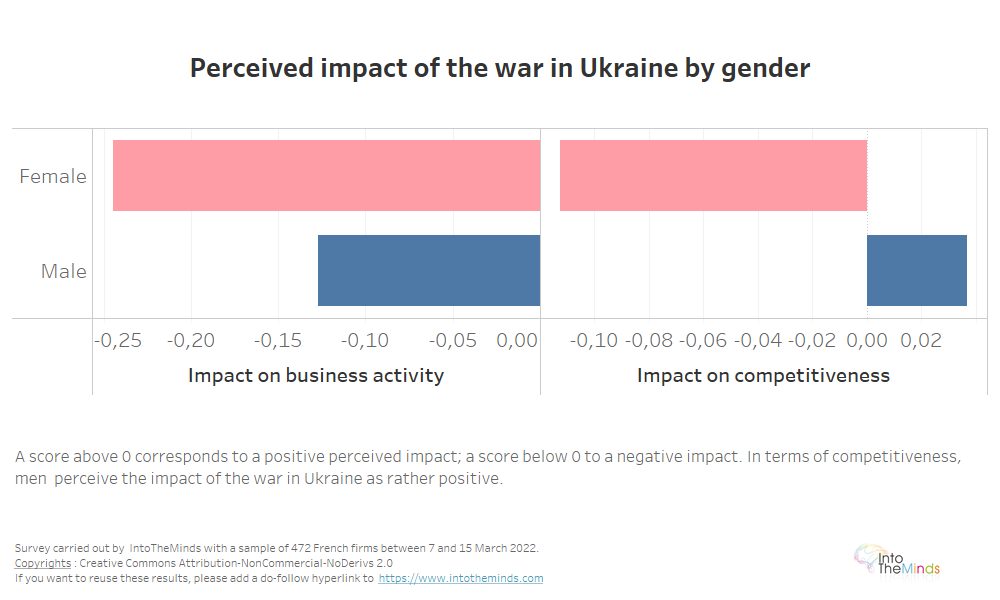
Posted in Entrepreneurship.